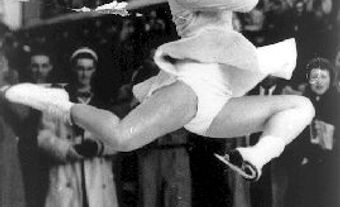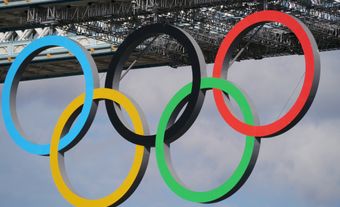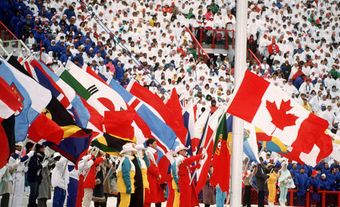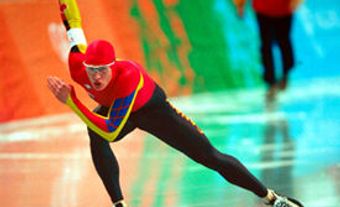Own the Podium is a non-profit organization that assists national sports bodies in Canada with their investment and training strategies. Based in Ottawa and Calgary, the program provides financial assistance to high-performance Canadian athletes and coaches. It enables them to compete as well as possible at the Olympic and Paralympic Games, with the goal of medalling (reaching the podium) as much as possible. It was created in 2005, in advance of the 2010 Olympic Winter Games in Vancouver. Own the Podium is funded by the Government of Canada, the Canadian Olympic Committee, the Canadian Paralympic Committee and the Canadian Olympic Foundation.

Background
For most of the 20th century, Canada’s success in international athletic competitions was sporadic. Individuals occasionally emerged as a top-tier figure in their sport, such as figure skater Barbara Ann Scott; sprinter Harry Jerome; alpine skier Nancy Greene; and speed skater Gaétan Boucher. But Canada seldom contended well enough to achieve a high placement in the overall medal standings. For example, Canada won only 41 medals at the Olympic Winter Games from 1936 to 1992, a span of 56 years. Canadian athletes won only 38 medals at the Olympic Summer Games in the 32 years between 1948 and 1980.
Team Canada’s results at the first two Olympic Games held in Canada (the 1976 Summer Games in Montreal and the 1988 Winter Games in Calgary) were poor. At the 1976 Olympic Games in Montreal, Canada became the first (and still the only) host nation to not win an Olympic gold medal. In Calgary in 1988, Team Canada won five medals, but as in Montreal, none were gold. (Canada did win gold medals in the unofficial demonstration events of curling, freestyle skiing and short track speed skating).
After hosting both the Olympic Summer and Winter Games, Canada had the resources and facilities available for its athletes to train. Still missing was a targeted contingency plan to assist all the national sports organizations across Canada.

Formation
Own the Podium was created in 2005, two years after Vancouver was awarded the 2010 Olympic and Paralympic Winter Games. The original Own the Podium fact sheet announced it as a “new national sport technical initiative designed to help Canada’s winter sports win the most number of medals at the 2010 Olympic Winter Games in Vancouver, and to place in the top three nations (gold medal count) at the 2010 Paralympic Winter Games.”
Olympic speed skater Cathy Priestner Allinger and her husband Todd Allinger were instrumental in creating the initial Own the Podium framework in 2004. (Priestner Allinger won a silver medal for Canada in women’s 500 m speed skating at the 1976 Olympic Winter Games in Innsbruck.)
Own the Podium’s focus was to target sports where Canada had the greatest chance of earning medals. Olympic sports such as skiing, speed skating, and snowboarding benefited from the program more than events such as ski jumping, biathlon, and Nordic combined.
A program called “Top Secret” was also created by Own the Podium to help athletes from a technological and sports science perspective. Getting the right equipment is essential for Canadian athletes to succeed. Athletes also received support from sports psychologists that helped them maximize performance from a mental standpoint. In addition to the targeted spending, there was also an effort to de-emphasize bureaucracy and to give more accountability to the athletes and coaches.
In all, $120 million was spent to assist Canadian high-performance athletes from 2005 to 2010. The Canadian Olympic Committee assisted the Own the Podium efforts further by raising additional funds through charity golf tournaments, auctions and dinners. Elite Canadian chefs even competed against each other in a cross-Canada program called Gold Medal Plates, with the proceeds going to Own the Podium.
2010 Olympic Winter Games
At the 2010 Olympic Winter Games in Vancouver, Canada won 26 medals, the third most among participating countries. Even better, their 14 gold medals were the most ever won by a single nation at an Olympic Winter Games. (Germany and Norway both tied the record at the 2018 Games in Pyeongchang).
The targeted-approach component of Own the Podium worked. Team Canada won five medals in short track speed skating, five medals in long track speed skating, and three medals each in freestyle skiing, bobsled, and snowboarding. Canada also won two medals each in their more naturally dominant sports of hockey and curling.
At the 2010 Paralympic Winter Games, Canada finished third behind Germany and Russia in gold medals (10) and total medals (19). Alpine skier Lauren Woolstencroft and cross-country skier Brian McKeever won a combined eight gold medals.
Winter Olympics Post-Vancouver
Success from the targeted approach continued at the 2014 Olympic Winter Games in Sochi and the 2018 Olympic Winter Games in Pyeongchang. In Sochi, Team Canada increased their medal count to 25. Nine of the medals came in freestyle skiing. In Pyeongchang, Team Canada won 29 medals — the most ever for Canada at a single Olympic Winter Games. Of the 29 medals, seven came in freestyle skiing and five came in short track speed skating. From 2010 to 2018, Own the Podium distributed a total of $210 million of funding in preparation for the three Olympic Winter Games alone.
Road to Excellence
In conjunction with the Winter Olympic program, a similar initiative called Road to Excellence was created in 2006 for summer sports athletes. Swimmer Alex Baumann, who won two Olympic gold medals in 1984, was named executive director. The goal of the program was for Canada to reach the top 16 at the 2008 Olympic Games in Beijing; the top 12 at the 2012 Olympic Games in London; and the top five at the Paralympic Games in Beijing, and London.
At the 2008 Olympic Summer Games in Beijing, Team Canada won 20 medals and finished in 15th place. At the 2012 Olympic Games in London, Canada duplicated their 20 medals from Beijing, but finished outside the top 12 in 14th place.
At the 2008 Paralympic Games in Beijing, Canada won 50 medals and finished 7th in the overall medal standings. The Canadian stars were swimmer Valerie Grand’Maison (six medals), and wheelchair racer Chantal Petitclerc (five gold medals). At the 2012 Paralympic Games in London, Canada won 31 medals and finished 20th in the medal standings.
For the 2016 Olympic Games in Rio de Janeiro, the name Road to Excellence was retired. The program was absorbed fully into Own the Podium. Canada won 22 medals and finished 10th in the overall standings.
Criticism
Some have argued that Own the Podium places too much emphasis on high performance athletes. They argue that more should be spent on grassroots programs and on sports where Canada traditionally has not had significant success. Although Own the Podium CEO Anne Merklinger has said that “winning medals is important to Canada,” Ed Willes of the Province has questioned how important winning medals really are to Canadians.
See also Canada at the Olympic Winter Games; Canada at the Olympic Summer Games; Canadian Olympic Committee; Canadian Women at the Olympic Winter Games.

 Share on Facebook
Share on Facebook Share on X
Share on X Share by Email
Share by Email Share on Google Classroom
Share on Google Classroom



